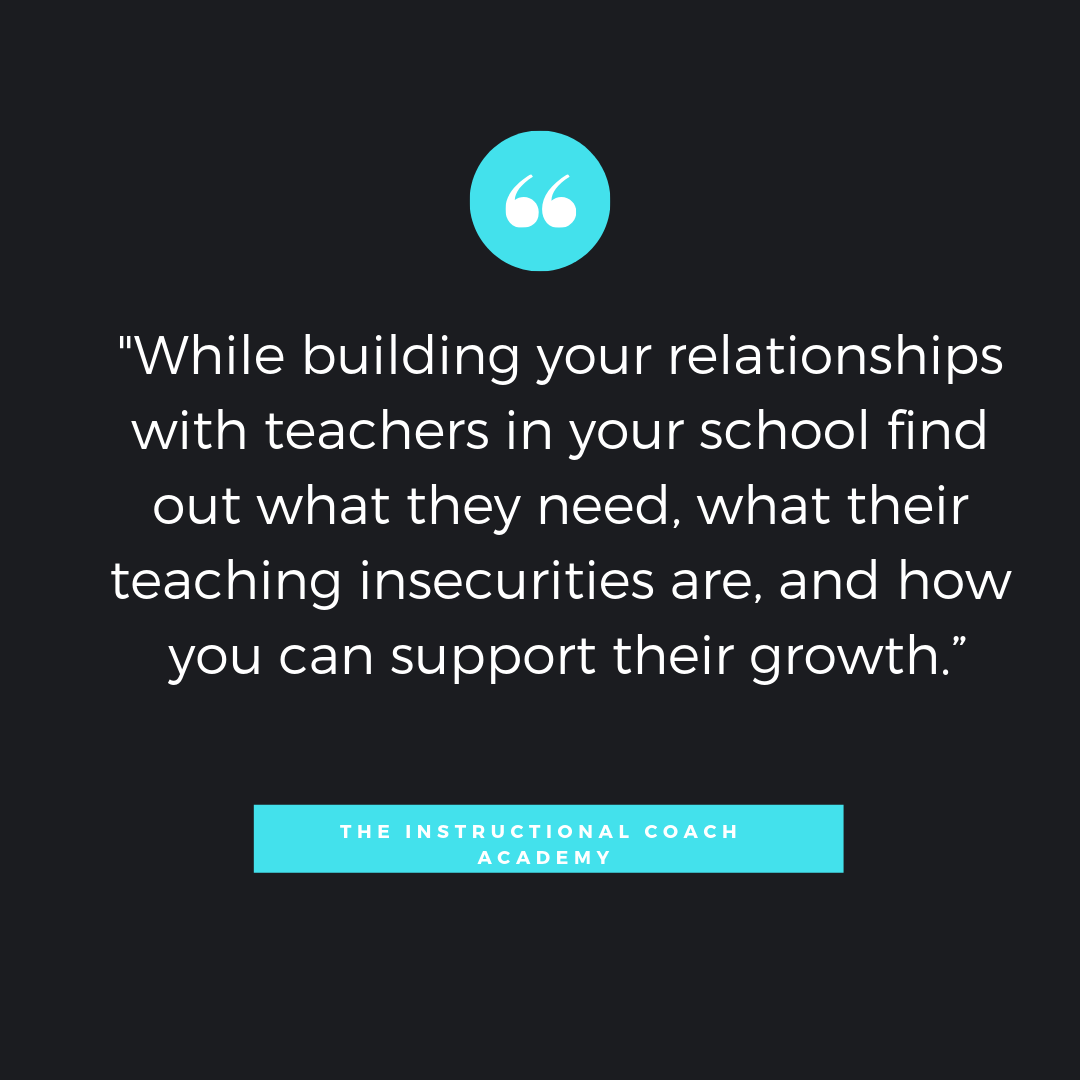As a coach, there comes a time when you are asked to work with a teacher who has not been one of the ones banging down your office door. This situation can cause feelings of discomfort for you and the teacher. Sometimes it is not that the teacher does not want to work with you as a coach. However, there could be some feelings of inadequacy, reluctance, and resistance to change. These feelings most likely have nothing to do with you. The idea here is to not take it personally. You are not there to have hurt feelings because you are not at the top of this particular teacher’s “friends” list. Being an Instructional Coach is not about any of that. It is about fostering a relationship with teachers to foster their growth in order to produce adequate growth in students.
Being an Instructional Coach is not about any of that. It is about fostering a relationship with teachers to foster their growth in order to produce adequate growth in students. Share on XAccording to the article produced by the Pennsylvania Institute for Instructional Coaching, it states, “while building your relationships with teachers in your school find out what they need, what their teaching insecurities are, and how you can support their growth.” In order to reach this plateau of growth, there must be a partnership that is built for it to occur. The teacher has to make the decision to be open and willing to grow and change. You, as the coach, have to be willing to facilitate the process, be open and leave judgment at the door. Here are some researched based strategies that you can help with the feelings that the teacher may have.
Feeling of Inadequacy: There will be teachers that you work with that feel inadequate in their teaching practices. One thing that helps before I even walk in the door is allowing myself to think back to a time when I felt the same exact way. No teacher has “arrived.” Every teacher can think of a time when they have had these feelings. Remember and hold on to your past feelings of inadequacy in the field of education because you are going to need to mentally refer to that while facilitating conversations with the teacher. Another way to begin to lessen the teacher’s feelings of inadequacy is reassurance that you are there to help and to build a partnership. Reiterate the fact that you are not there to judge them or to ridicule them with your note-taking, observing, modeling, co-planning, etc. You are there to facilitate and aid in the teacher’s growth so that ultimately their students will make strides.
Feeling of Reluctance: There will always be teachers who are a little reluctant, especially in uncomfortable situations such as involuntarily working with the Instructional Coach. However, there are ways to help with this. One way is to have open communication with the teacher and let them know that what you discuss is confidential. Remember, as the coach, you are in their room without invitation. However, I would state that working together can be an experience of both growth, exploration, and celebration. But be honest that there will also be constructive feedback that will be given in the process. In order for that growth to occur, there has to be openness, willingness, and honesty. The teacher will have to let down some walls and for you to help them do that, they have to see you as a support system that they can trust and with whom they can be open.
Resistance to Change: “I’ve always done it this way,” or, “This is the way it’s always been done,” are comments you often hear from teachers who are not ready and sometimes unwilling to alter their instructional practices and are reluctant to change. However, with a solid relationship established, a supportive environment and building trust, you will be amazed as to how much teachers are willing to change and expand their instructional horizons. One way for this to happen is through other teachers that you have coached. Once the “word” begins to spread about the work you are doing in other rooms, along with student growth, more teachers will begin to open up and allow small significant changes to their instruction.
Sometimes as a coach when we are putting in the authentic work of building relationships, building trust and supporting teachers, we can become discouraged when there are teachers who are not as receptive to our work. The key is, to begin with the end in mind and remember, ultimately you are there to support teachers to aid in student growth. When we keep that at the forefront of our minds, we will be able to keep pushing forward in doing what is best for students.


![[Instructional Coach Chronicles] Working With a Teacher You Don’t Like](https://theinstructionalcoachacademy.com/wp-content/uploads/2018/04/the-instructional-760x400.png)